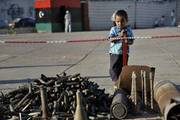Churches Campaign for Treaty to Tackle Illicit Arms Sales, Often a North-South Business

Churches Campaign for Treaty to Tackle Illicit Arms Sales, Often a North-South Business
Contact: media@wcc-coe.org, +41 79 507 6363
GENEVA, April 2, 2012 /Standard Newswire/ -- The following is submitted by Jonathan Frerichs (*)
After July, arms used to commit atrocities and serious crimes may become harder to buy, and harder to sell, internationally. That is if governments already agreed on the need to regulate the arms trade can agree on a treaty that is fit for the task and covers all conventional weapons. Diplomats from nearly 200 countries will spend July at the United Nations to negotiate the proposed Arms Trade Treaty.
Photo: Months of fighting in Misrata, Libya, left an abundance of ordnance scattered all over the city. © ACT Alliance/Paul Jeffrey
Diplomats from nearly 200 countries will spend month of July at the United Nations to negotiate the proposed Arms Trade Treaty.
Their challenge lies in keeping the arms trade open to militaries, police forces and other groups who are judged to use arms legally and responsibly, and closing the trade to those who don't. Arms manufacturers, gun enthusiasts, as well as civil society organizations and churches are seeking to influence the outcome.
The human impact of the arms trade is the galvanizing factor for churches. A campaign led by the World Council of Churches (WCC) is working to ensure that the treaty protects people and communities put at risk by current arms trade practices. Churches from more than 30 countries are involved. Some participants are from countries that profit from the trade and others are from countries that suffer as a result.
Campaign representatives have met so far with 20 governments from Africa, Asia, Europe and the Americas developing measures to make the treaty strong and effective.
Millions of lives are shattered or lost in armed violence each year and "badly regulated exports, imports and transfers of weapons must bear part of the blame," says a WCC policy statement issued recently to guide the campaign.
The policy affirms the fact that 153 governments have agreed to adopt "the highest possible common international standard" for how conventional arms may be traded, but it warns that the treaty must work to stop arms for governments that "pose a threat to their own people or to other states" and to block shipments likely to be diverted to armed groups, organized crime or smugglers.
Prohibition on arms sales
The ecumenical policy says the treaty must prohibit arms sales where there is a "substantial risk" of serious violations of international human rights or humanitarian law, where there is a pattern of gender-based armed violence or where development work will be seriously impaired. These positions are shared with a broad range of civil society organizations in a coalition known as Control Arms.
The WCC-led campaign bridges a north-south divide that shapes the arms trade. Churches from major arms producers like the US, Sweden and Norway lobby alongside churches from the Democratic Republic of Congo, Uganda and Sierra Leone, where imported arms fuel conflict and violence. Churches want stricter controls on both sides. Lives and communities will be spared to the extent that sellers, middlemen and buyers are all held to higher and more consistent standards along a supply chain that usually runs from the Global North to the Global South.
More than 100 religious leaders – Christian, Muslim, Jewish and others have signed an interfaith declaration to governments supporting an Arms Trade Treaty.
The ecumenical campaign began in October 2011 with participants from the International Ecumenical Peace Convocation and an endorsement from the WCC Central Committee earlier in the year.
(*) Jonathan Frerichs, WCC programme executive for peace building and disarmament, is a member of the Evangelical Lutheran Church in America.
Sign the "Inter-Faith Declaration in Support of an Arms Trade Treaty" (available in Arabic, English, French, Spanish and Portuguese).
The World Council of Churches promotes Christian unity in faith, witness and service for a just and peaceful world. An ecumenical fellowship of churches founded in 1948, today the WCC brings together 349 Protestant, Orthodox, Anglican and other churches representing more than 560 million Christians in over 110 countries, and works cooperatively with the Roman Catholic Church. The WCC general secretary is Rev. Dr Olav Fykse Tveit, from the [Lutheran] Church of Norway. Headquarters: Geneva, Switzerland.




 Sign Up to Receive Press Releases:
Sign Up to Receive Press Releases: